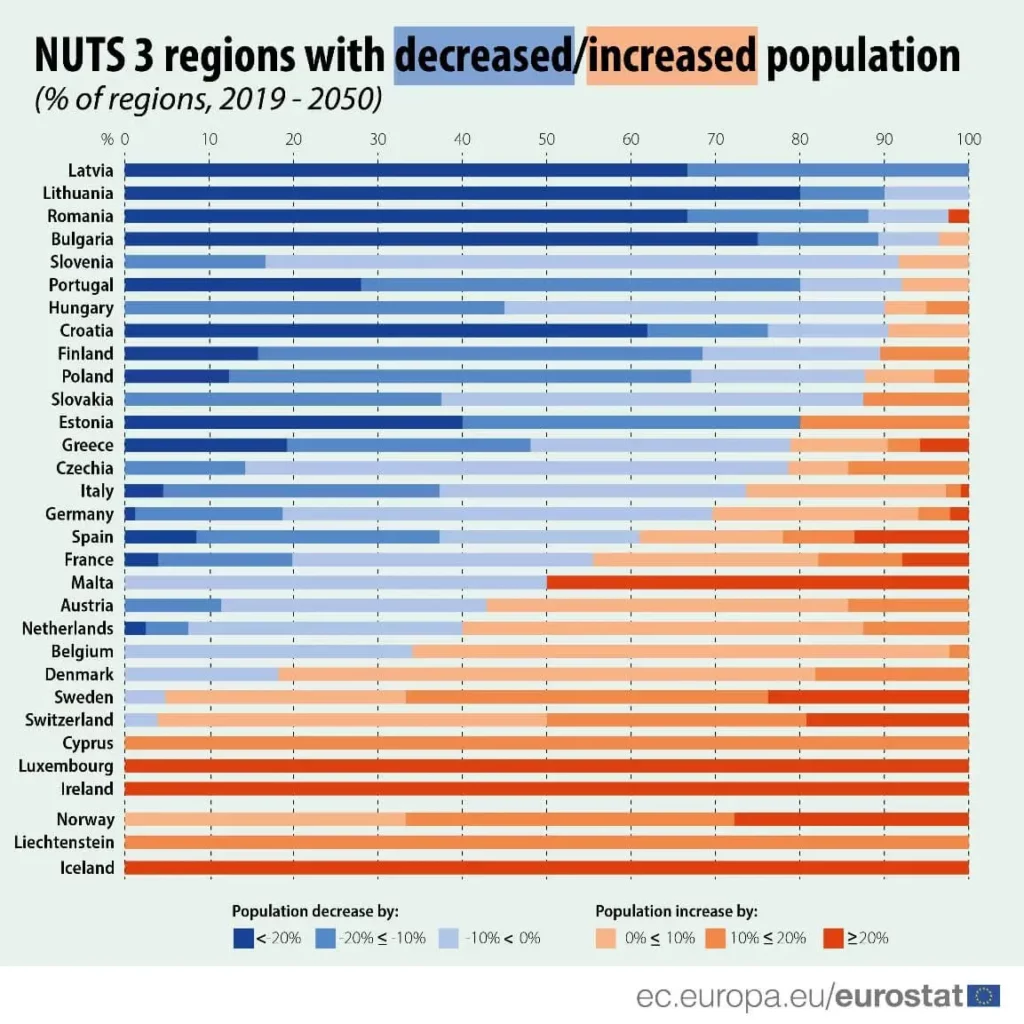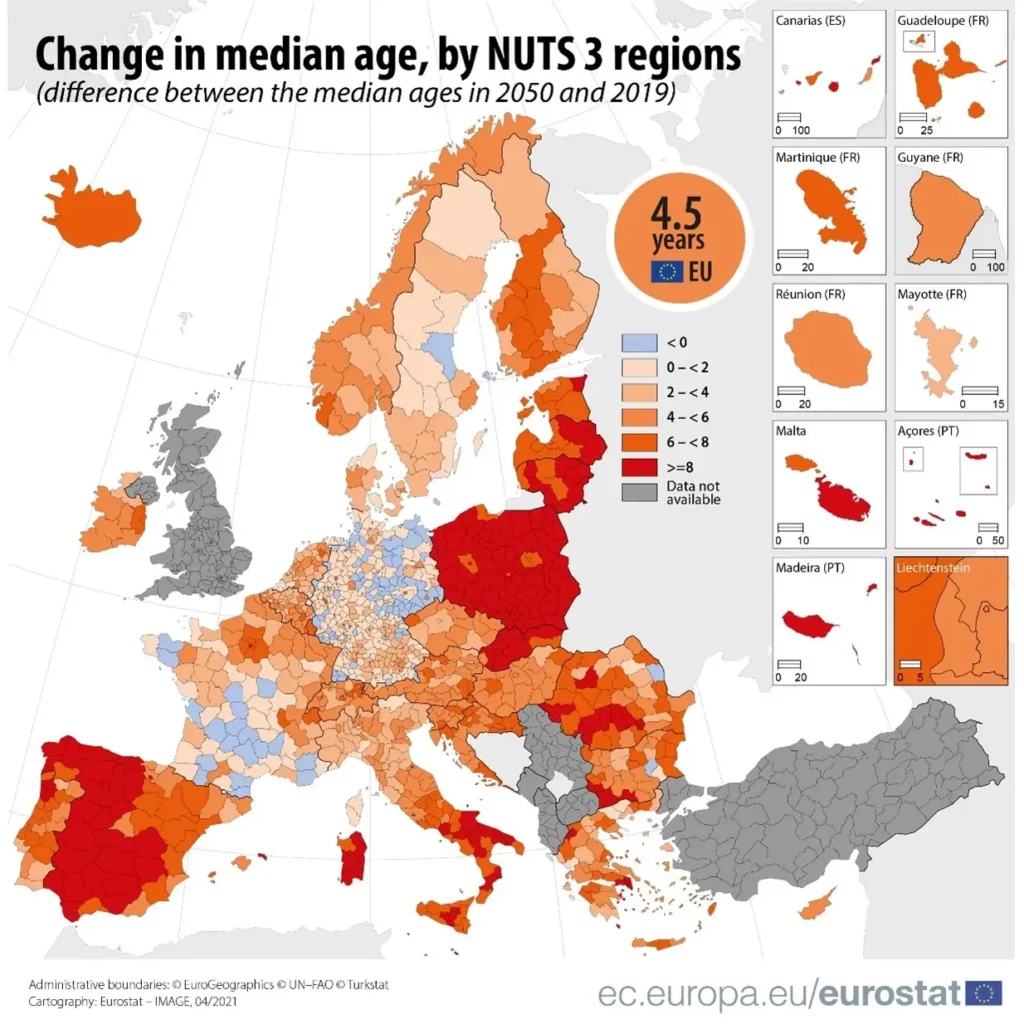The shortage of skilled workers in Europe is a malaise that has been creeping upon us, gradually gnawing at the very fabric of Western society. The demographic shifts, economic upheavals, and social transformations of recent years have all conspired to create a deficit of skilled labor that threatens to unravel the very threads of years of progress and prosperity.
So come forth, as we dive deep and explore what gave rise to such a dire state in the first place, and the possible solutions to overcome this predicament.
Decline in Population
Population decline in Western Europe has been an issue that has plagued the minds of demographers and policymakers in recent years. The decline is caused by a combination of factors, including low birth rates and aging populations.

One of the main drivers of population decline in Western Europe is the low fertility rate. The total fertility rate (TFR), which measures the number of children born to a woman over her lifetime, has been below the replacement level of 2.1 in many Western European countries for several decades. The TFR in countries like Germany, Italy, and Spain is currently around 1.5, which is well below the replacement level.
Another perpetrator to this invisible crime is an aging population. As people live longer and have fewer children, the proportion of older adults in the population increases. This puts pressure on social security systems and the labor market, as there are fewer working-age adults to support the needs of retirees.

To sum it all up, the aging of the population and the decline in birth rates have stolen away skilled labor force, leaving Europe with a dearth of workers to fill the crucial roles that drive our economy. As life expectancies soar and families shrink, the pool of potential skilled workers dwindles, and older workers retire at a faster pace than they are replaced by young, capable hands.
Advancement in Technology
It is not only demographics that have brought Europe to this dire state of affairs. The rapid pace of technological advancement and the changing nature of work have also played their part, creating a chasm between the skills of the current workforce and the needs of the modern economy.
The skills of the current workforce are becoming increasingly outdated. Many jobs that once required little more than a high school education are now being replaced by machines or Artificial Intelligence. This is leading to many workers being left behind, unable to find jobs that match their skillsets.
This disconnect is only getting worse as technology continues to evolve at a rapid pace. In the past, when technology changed at a slower pace, workers had time to adapt their skills to the new economy. But now that tools and equipment get outdated faster than UK gets a new Prime Minister, the workers are struggling to keep up.
Anti-Migration Laws
The winds of migration, which have historically brought fresh talents and skills to our shores, have been stymied by the anti-immigrant sentiments that have swept through certain corners of Western Europe. Companies are left to fend for themselves, unable to recruit the foreign workers they need to fill vital positions, despite the desperate cries of industry

Over the past decade or so, many European countries have enacted strict anti immigration laws in an effort to stem the flow of refugees and undocumented migrants into their countries.
While these policies have been effective in reducing the number of people entering Europe illegally, they have also led to a hostile environment for many immigrants, causing many to leave. This has led to a shortage of skilled labor in several industries, as many immigrants are highly educated and have experience in areas that are in high demand.
Construction, agriculture, and hospitality are just a few of the sectors that have been hardest hit by the skilled labor shortage. With fewer people available to do the work, businesses are struggling to keep up with demand. This has led to a rise in prices for goods and services, as well as a decrease in quality.
But all is not yet lost…
To turn back the tide of this skilled labor shortage, there is not going to be a singular solution that fits all. A multifaceted approach needs to be adopted to combat this crisis.
Europe must strive to increase the number of young people entering the workforce by any means necessary, be it through policies that support families or increased investments in education and training. There must also be a focus on developing the skills of the existing workforce, and providing opportunities for lifelong learning and retraining.
And as they strive to build a skilled workforce from within, Europe must also open their arms to the talents and skills of immigrants, adopting policies that welcome and facilitate their integration into society.
And last but not the least, let us not forget the role of employers, who must take responsibility for the development of their employees and actively work to expand their recruitment efforts to underrepresented groups.
However, no matter how pithy and rosy these solutions may sound, the one thing they all have in common is that they will take time to show results. So, what can businesses and industries do until the the labors of these policies bear their fruits?
Remote Resource: The Answer to Your Woes
With a recession looming around the corner, a lack of skilled workers isn’t exactly going to help businesses salvage what little opportunities they can. Regardless of the infrastructure and clientele they can procure, not having the right team members is going to be the roadblock that brings their journey to an end.
To deal with it I am going to suggest a solution that might be unappealing to some, and perhaps even blasphemous to a few, but hear me out.
Outsourcing is the solution that is going to save you from this doom.
While many of you may have seen a rampart attack on the idea of outsourcing, calling it an egregious waste of time and money, allow me to put your mind at ease.
While yes, some claims made by these people are indeed alarming, most of it, is being blown out of proportions. Concerns like data security, contractual obligations and lack of talented candidates are indeed prevalent in most outsourcing agencies.
However, I am not suggesting that you pick just any outsourcing agency, I am suggesting that you pick the best one.
Remote Resource guarantees their clients that they will only work with the Top 10% of the talent in India. Every resource for them must have at least 5 years of experience in a Fortune 500 company and must be a graduate of one of the Top 20 Educational institutes in India.
Headaches like long and binding contracts and concerns of data security are not something that will bother you here, as Remote Resource has adapted a revolutionary pay-as-you-model allowing the client to terminate the contract at any time without much hassle.
And cherry on top, since education is relatively cheaper in India, students do not need to take out loans to pay for tuition. This makes them more amicable to work at a lower compensation package when compared to their western counterparts, while making no compromises on the level of skill. So, when a business hires a candidate from Remote Resource they can end up saving up to 60% on their employee’s wage!
Do not be undone by this shortage of skilled labor, it is but a mere hiccup on your journey to success. Instead, rise to meet the challenge head-on. By joining forces, will we be able to ensure that Europe has the skilled workforce it needs to continue on the path of progress and prosperity.


